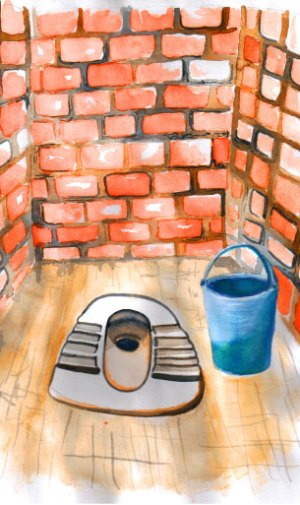
Sanitation
Lack of access to sanitation has a profound negative impact on many human rights. Diarrhoea is one of the biggest killers of children under 5 in the world. Too often, the contents of people ’s toilets are emptied into the streets, or even into nearby streams and rivers, which then serve as drinking water for the population, with devastating health consequences. Poor sanitation also has a serious impact on the right to education, with kids missing school due to water and sanitation related diseases. Girls especially drop out when there are no sex segregated toilets. Women, as the primary caregivers of sick relatives lose out on work opportunities when they stay home to care for the ill.
In urban slums, the sanitation problems are particularly severe, with human excreta lining the streets and contaminating the food, water and general living environment. Lack of access to sanitation is a symptom and consequence of poverty.
Most of all though, sanitation is about dignity. The Supreme Court of India has observed that the failure to provide access to sanitation “drives the miserable slumdwellers to ease in the streets, on the sly for a time, and openly thereafter, because under Nature’s pressure, bashfulness becomes a luxury and dignity a difficult art.”.
Despite its importance, sanitation is frequently neglected. It is not prioritized in most development aid programmes, and it receives less funding than the associated area of water. The lack of serious attention to the problem of sanitation is also evident in the absence of effective national policies, diverse and fragmented responsibilities for sanitation across government ministries, and a general lack of understanding of the positive effects of investing in sanitation.
In 2000 when the countries of the world came together to adopt the Millennium Declaration, again the issue of sanitation was neglected. Fortunately, in 2002, at the World Summit on Sustainable Development, targets related to sanitation were added to the MDG efforts. The MDGs pledge to halve the proportion of people without access to basic sanitation by 2015. Regrettably, studies on progress toward the achievement of the MDGs reveal that the sanitation target is one of the most off track of all the MDGs. And even if the world harnesses all of its political will and resources to meet that MDG target, 1.8 billion people will still not have access to sanitation. Human rights demand universal access.
The Special Rapporteur devoted her 2009 HRC annual report to sanitation. In the report, she asserted that there are clear human rights obligations related to sanitation because it is inextricably link to, and indispensable for, the realization of many other human rights. She also outlined a definition of sanitation in human rights terms, and explained the human rights obligations related to sanitation, as well as the content of those obligations. The report is available in all UN languages: E F S A C R.
In order to benefit from diverse views and perspectives, the Special Rapporteur organized a public consultation on the issue of human rights obligations related to sanitation on 29 April 2009.
In July 2010, the United Nations General Assembly recognized the right to water and sanitation. In September 2010, and again in March 2011, the UN Human Rights Council affirmed this recognition. These important developments solidify the status of sanitation as a human right and constitute significant evolution of international human rights norms in this regard. Furthermore, in November 2010, the Committee on Economic, Social and Cultural Rights issued a statement on the right to sanitation, which further explained the nature of this right.
